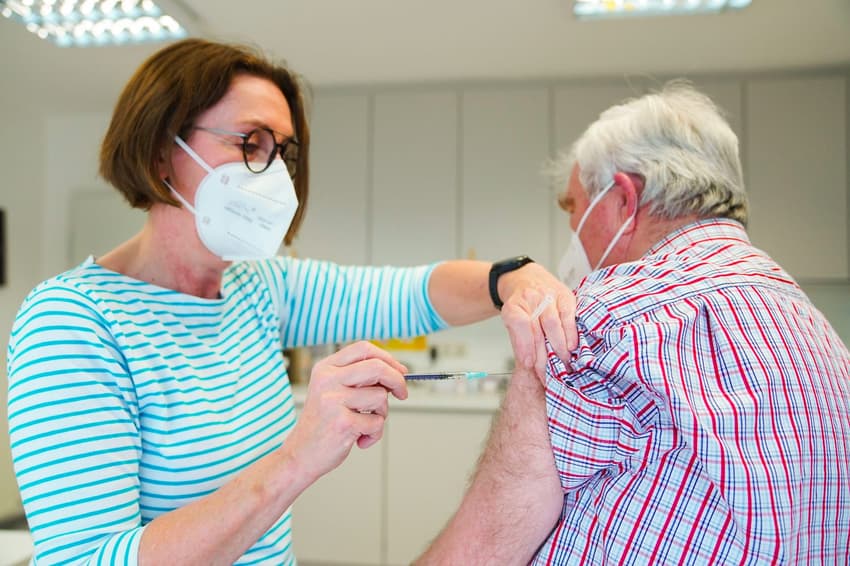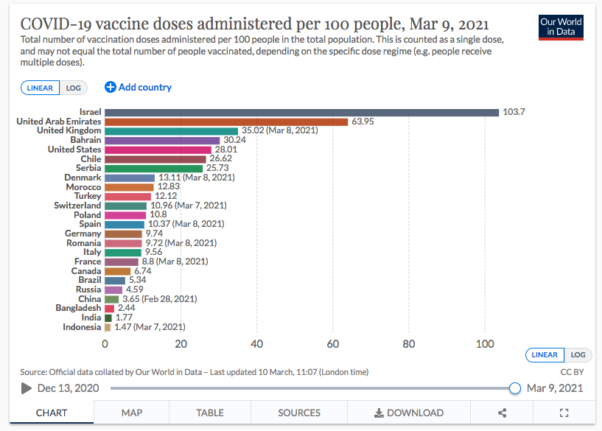How family doctors will speed up Covid-19 vaccinations across Germany from April

Germany's vaccination campaign is to get a major boost soon thanks to more supplies of Covid-19 vacines and allowing doctors' surgeries to give out jabs.
The country's sluggish coronavirus vaccine campaign is to gradually gain momentum with the planned inclusion of doctors' surgeries from April, Health Minister Jens Spahn said on Wednesday.
However, it will take time to build up speed. The number of vaccines given out will not "immediately grow to 20 million a month or to 10 million a week", Spahn told broadcaster ZDF.
He said that vaccinations can be carried out more flexibly in GPs' practices. "The doctors know their patients and know who should be vaccinated first," said Spahn. The next step is vaccinations in workplaces by company doctors.
READ ALSO: When will I be in line for a Covid vaccination in Germany?
On Wednesday, health ministers of the federal and state governments were due to discuss further details and the exact starting date for GP practices to inoculate people.
The ministers also want to clarify how the doses will be distributed among the regional vaccination centres in the states, and the GP practices. The bureaucratic effort for doctors is to be reduced to a minimum, DPA learned from sources.
Up to now, vaccinations have been carried out mainly in vaccination centres and with mobile vaccination teams that travel to nursing homes, for example. In some states there have been successful pilot projects for jabs in doctors' practices.
How many people have been vaccinated against coronavirus?
While the UK, USA and Israel have forged ahead with their vaccination programmes, Germany and other EU countries have been slowed down by supply shortages and limits set on the use of the AstraZeneca vaccination. That's been compounded by reservations about the AstraZeneca jab.
READ MORE: Why have tens of thousands of Germany’s AstraZeneca vaccines not been used?
So far, about three percent of people in Germany have been fully vaccinated with both doses, and 6.7 percent have received a first dose. About 8.1 million doses have been administered since the inoculation programme started shortly before the start of 2021.

Screenshot: Our World in Data
Due to low supplies of vaccine doses, there is a priority order to who gets the jab first. The highest priority is given to the elderly, health workers at high risk of infection and people with underlying diseases.
Spahn said: "I have a very high level of trust in doctors that they will vaccinate those patients first who are also most at risk." Prioritisation would generally continue to be necessary, he said, adding: "Saving lives is not bureaucracy."
Could people be vaccinated earlier?
The head of the National Association of Statutory Health Insurance Physicians, Andreas Gassen, believes it's possible to vaccinate 20 million people per month in Germany from April - and bring forward the deadline for offering all adults a vaccine by September 21st.
A first dose for all adults could be offered by the first half of June, and full immunisation by the beginning of August, Gassen told Welt.
The prerequisite for this is a rapid supply of vaccines. With five million doses administered per week in the practices and about 1.5 million vaccinations in centres, "a much earlier date than September 21st" is achievable, he said.
What's the plan for coronavirus hotspots?
The EU is to receive an extra four million BioNTech/Pfizer vaccine doses over the next two weeks to be deployed to Covid-19 "hotspots", European Commission chief Ursula von der Leyen said on Wednesday.
The additional package has been negotiated so that EU states can vaccinate in problem regions and slow down more contagious virus variants.
Germany could receive around 18.6 per cent of the additional quota - 740,000 doses.
After the EU announcement, Bavarian leader Markus Söder announced that Bavarian Covid hotspots on the border with the Czech Republic would receive an additional 100,000 doses of vaccine.
Altogether there will be an additional 150,000 doses for the border regions particularly affected by the British variant of the virus.
Comments
See Also
The country's sluggish coronavirus vaccine campaign is to gradually gain momentum with the planned inclusion of doctors' surgeries from April, Health Minister Jens Spahn said on Wednesday.
However, it will take time to build up speed. The number of vaccines given out will not "immediately grow to 20 million a month or to 10 million a week", Spahn told broadcaster ZDF.
He said that vaccinations can be carried out more flexibly in GPs' practices. "The doctors know their patients and know who should be vaccinated first," said Spahn. The next step is vaccinations in workplaces by company doctors.
READ ALSO: When will I be in line for a Covid vaccination in Germany?
On Wednesday, health ministers of the federal and state governments were due to discuss further details and the exact starting date for GP practices to inoculate people.
The ministers also want to clarify how the doses will be distributed among the regional vaccination centres in the states, and the GP practices. The bureaucratic effort for doctors is to be reduced to a minimum, DPA learned from sources.
Up to now, vaccinations have been carried out mainly in vaccination centres and with mobile vaccination teams that travel to nursing homes, for example. In some states there have been successful pilot projects for jabs in doctors' practices.
How many people have been vaccinated against coronavirus?
While the UK, USA and Israel have forged ahead with their vaccination programmes, Germany and other EU countries have been slowed down by supply shortages and limits set on the use of the AstraZeneca vaccination. That's been compounded by reservations about the AstraZeneca jab.
READ MORE: Why have tens of thousands of Germany’s AstraZeneca vaccines not been used?
So far, about three percent of people in Germany have been fully vaccinated with both doses, and 6.7 percent have received a first dose. About 8.1 million doses have been administered since the inoculation programme started shortly before the start of 2021.

Screenshot: Our World in Data
Due to low supplies of vaccine doses, there is a priority order to who gets the jab first. The highest priority is given to the elderly, health workers at high risk of infection and people with underlying diseases.
Spahn said: "I have a very high level of trust in doctors that they will vaccinate those patients first who are also most at risk." Prioritisation would generally continue to be necessary, he said, adding: "Saving lives is not bureaucracy."
Could people be vaccinated earlier?
The head of the National Association of Statutory Health Insurance Physicians, Andreas Gassen, believes it's possible to vaccinate 20 million people per month in Germany from April - and bring forward the deadline for offering all adults a vaccine by September 21st.
A first dose for all adults could be offered by the first half of June, and full immunisation by the beginning of August, Gassen told Welt.
The prerequisite for this is a rapid supply of vaccines. With five million doses administered per week in the practices and about 1.5 million vaccinations in centres, "a much earlier date than September 21st" is achievable, he said.
What's the plan for coronavirus hotspots?
The EU is to receive an extra four million BioNTech/Pfizer vaccine doses over the next two weeks to be deployed to Covid-19 "hotspots", European Commission chief Ursula von der Leyen said on Wednesday.
The additional package has been negotiated so that EU states can vaccinate in problem regions and slow down more contagious virus variants.
Germany could receive around 18.6 per cent of the additional quota - 740,000 doses.
After the EU announcement, Bavarian leader Markus Söder announced that Bavarian Covid hotspots on the border with the Czech Republic would receive an additional 100,000 doses of vaccine.
Altogether there will be an additional 150,000 doses for the border regions particularly affected by the British variant of the virus.
Join the conversation in our comments section below. Share your own views and experience and if you have a question or suggestion for our journalists then email us at [email protected].
Please keep comments civil, constructive and on topic – and make sure to read our terms of use before getting involved.
Please log in here to leave a comment.